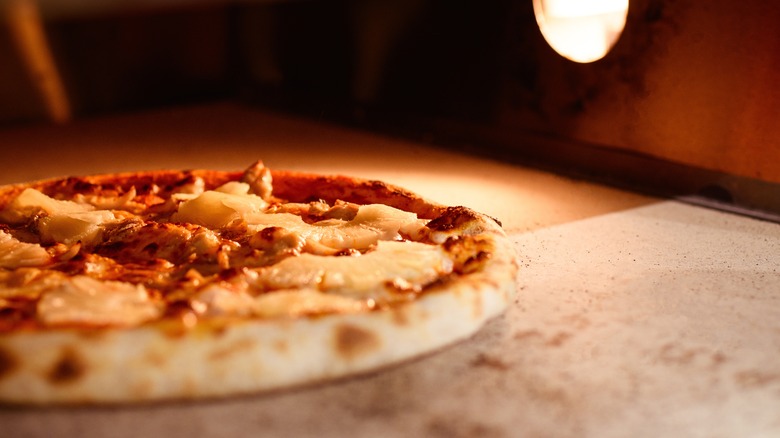How To Properly Clean Your Pizza Stone
A good pizza stone can play a crucial role in achieving a picture-perfect pizza. By retaining heat and promoting a golden, evenly cooked crust, it is a preferred method of home chefs and restaurants alike. However, a pizza stone requires a little TLC to get the most out of it. So, how does one properly clean a pizza stone?
Most pizza stones aren't in fact stone, but rather crafted from ceramic materials, such as unglazed clay or cordierite, a mineral-based ceramic. Well-cared-for pizza stones can last for years and years. Something to note is that discoloration is normal and not to be confused with needing a cleaning. A pizza stone will acquire darkened areas over time through natural use. The best way to stay on top of cleaning a pizza stone is to clean it after every use.
To clean a pizza stone, first ensure that it has completely cooled after its last use. Start by gently scrubbing the surface of the stone with a stiff nylon brush to remove any leftover pizza residue. In many cases, this is all you may need to do to clean it in between uses. However, if bits of food remain stuck to the stone, try scrubbing it with a brush under running water. If you are still having difficulty, a bit of salt or baking soda can be used to scrub the more stubborn bits. Once the pizza stone is sufficiently clean, pat it dry with a cloth, let it air dry, and then store it.
What not to do when cleaning a pizza stone
It's crucial to follow some important tips when caring for pizza stones to ensure their longevity and effectiveness. Ignoring best practices can result in a damaged pizza stone.
Firstly, always allow the stone to cool off slowly. Rapid changes in temperature can cause the pizza stone to crack or even explode. Secondly, never submerge or soak a pizza stone in water when cleaning it, as it will absorb the water and increase the risk of cracking. Additionally, never use soap when scrubbing or rinsing the stone, as its highly absorbent nature can result in soapy-tasting pizza, and nobody wants that! The same goes for oil; a pizza stone will absorb oil, leading to a burnt oil flavor and a smoking oven.
By following these special guidelines, you'll keep your pizza stone in tip-top shape, ensuring it serves up delicious, perfectly cooked pizzas every time. Remember, a little care goes a long way.

